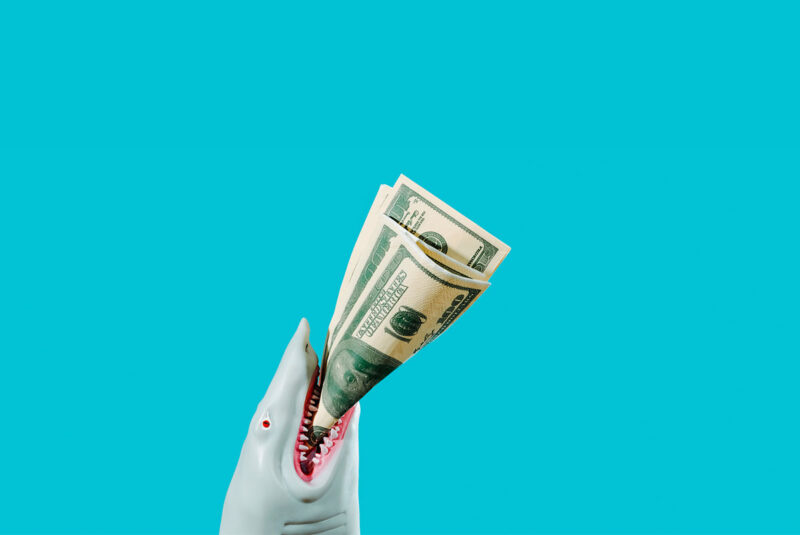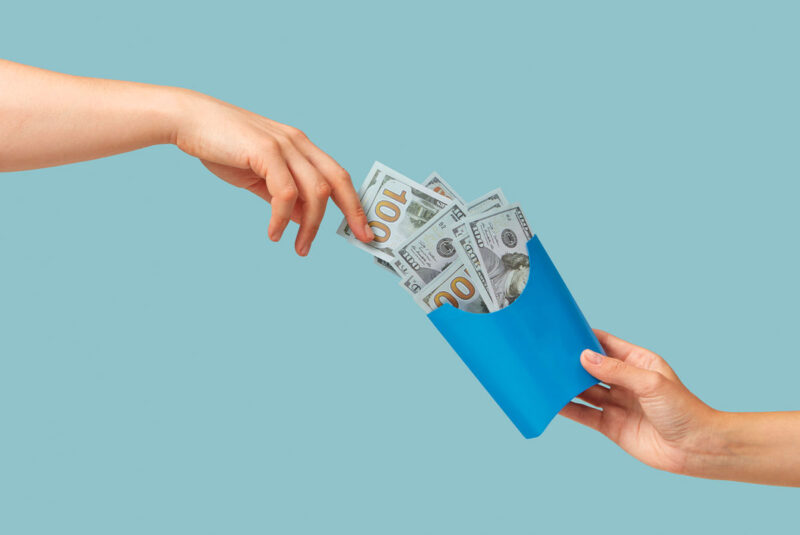Explore your mortgage options
Looking to tackle a home remodeling project soon, or maybe to consolidate some high-interest debt? There are a lot of options out there to get the cash you need, and it’s important to compare personal loans, credit cards and other types of debt to make sure you’re making smart financial decisions.
There are lots of benefits to obtaining a personal loan, as long as this borrowing option makes sense for your financial situation. We’ll discuss these benefits and help you decide whether a personal loan is right for you.
Ready for a Personal Loan?
Applying through Rocket LoansSM is fast and easy.
Checking your options won’t affect your credit score.
The Short Version
- Personal loans can get you a lump sum of money in less than a week – and same-day funding may be available
- You can use the money however you want, but some popular uses are for home improvements or managing existing debt
- You can pay it back with fixed monthly payments over a period of years
What Are the Benefits of Obtaining a Personal Loan?
There are several benefits to obtaining a personal loan. Borrowers can use the funds for a variety of purposes, such as making home improvements, consolidating existing debts, covering emergency expenses and more.
Personal loans typically have less stringent borrowing requirements, shorter processing times and quicker disbursement of funds than alternative financing options such as home equity loans and home equity lines of credit (HELOCs).
Let’s have a more detailed look at these and other benefits.
1. Flexible use of funds
The way you use your personal loan is essentially up to you. That said, some uses are wiser than others. The best way to make the most of your loan is to have a plan in place for how to use it.
One of the most popular ways to use a personal loan is to consolidate high-interest debt (more on that below), but there are several other options at your disposal. If you want a way to make your money back in the long-run, spending it on select home improvements can be a great investment. The money you spend on your home can immediately increase its value, building your equity and making it more attractive to potential buyers in the future.
Unfortunately, not all home improvements are planned out. Emergency home repairs, such as fixing a leaky roof or broken water heater, can put you back thousands of dollars in an instant. A personal loan can get you the funds you need quickly to get your home back to full health. Other emergency uses for a personal loan include medical expenses and vehicle repairs.
2. Fast approval and disbursement
If you thought all loans take as long to be approved as a mortgage, think again. The speed that you can get approved and have the money in your bank account is one of the surprising and convenient factors of a personal loan. Approval and disbursement can take up to a week, but you may be able to get approved and get your funds within a single business day.
The timeline largely depends on the type of lender, your bank, and the details of your credit history and personal information. If lenders need to reach out to you for further documentation about your credit or employment status, it could extend the process. Your bank may also take time to process the loan and make it available in your account. If you’d like to get your money as fast as possible, look into lenders that offer pre-qualification so you can get the paperwork organized and settled before you need funds.
3. Lump sum funding
When you receive a personal loan, you have access to the entire amount from day one. This immediate influx of cash lets you utilize the full power of your loan from the start so you can make the most of it as quickly as possible. If you have a big emergency bill on the way or a large amount of credit card debt that you need to consolidate, you will need a large amount of money all at once.
4. Usually no collateral requirement
Many types of loans, including mortgages, home equity loans, HELOCs and auto loans, require you to offer a valuable asset that you own as collateral to receive the funds. That means that if you miss a payment, you risk losing that collateral to your lender. So, your car could be repossessed or your home could be foreclosed on.
On the other hand, personal loans are typically unsecured, meaning they don’t require you to offer any collateral to receive the loan. While your credit will still take a hit if you don’t make your payments, you don’t risk losing any other valuable assets.
5. Option to consolidate higher-interest debts
As we mentioned above, borrowers will often use a personal loan to consolidate debts. That’s because personal loans typically have a lower interest rate than higher-interest debt such as credit cards.
With debt consolidation, you essentially use one loan to pay off multiple sources of debt at one time. This way you can combine several variable and confusing debt payments into one manageable payment that you can afford. If the stress of tracking multiple credit card payments is wearing you down, this might be your best avenue toward financial freedom.
6. Fixed interest payments
Another key aspect of personal loans that can relieve your stress is their predictable monthly payments. Personal loans have fixed interest rates, so you pay the same amount each month. This allows you to accurately manage payments far into the future. With variable-rate loans, you run the risk of your monthly payments increasing to an unaffordable level if interest rates rise.
Personal loans are a great option if you want to make a long-term financial plan and avoid the stress of constantly tracking interest rates.
7. Long-term timeline
While you may receive the money in a matter of days, you will have a whole lot more time to pay it back. Personal loan terms typically extend from 2 – 10 years. This allows you to spread your payments over a longer period, decreasing the amount you pay each month. This makes your payments much more affordable and easier to plan for along with your other financial needs.
8. Can improve your credit score
One way to crash your credit score is to start missing credit card payments. However, a personal loan to consolidate that debt may give you the lifeline you need to maintain your excellent credit or build it up. Since personal loan payments are more predictable and manageable than credit card payments, you can plan from day one of the loan for how you will pay them back every month. With each payment you make, your credit score gets better and better.
But that’s not the only benefit. Another key factor affecting your credit score is your credit mix. Receiving a personal loan can diversify your credit mix and improve your score even before you repay a large amount of it.
Should You Get a Personal Loan?
Now that you’ve seen all of these personal loan benefits, you’re probably wondering when you should get a personal loan. In an ideal scenario, the best time to get a personal loan is when you have excellent credit and need money as soon as possible. If your credit can get you the best interest rates when you need to make some large purchases, such as home improvements, a personal loan is a great tool.
If you’re not in the best financial position and credit card payments are piling up, a personal loan may still be a good option. Consolidating your debts into one manageable payment can put you back and track and rebuild your credit.
However, personal loans aren’t your only option if you need cash. See for yourself below!
Alternatives to a personal loan
- Home equity loan: A home equity loan is a type of second mortgage that uses your home’s equity as collateral. Similar to a personal loan, you will receive a lump sum payment and pay it back over a period of years with fixed monthly payments.
Home equity loans differ from personal loans in that they are secured loans, so if you miss payments on the loan, you risk losing your home to foreclosure.
- Home equity line of credit (HELOC): HELOCs are similar to home equity loans because they are also a type of second mortgage that uses your home’s equity as collateral.
However, HELOCs differ from personal loans because you receive access to a line of credit up to a credit limit, similar to a credit card, instead of a lump sum payment.
- Cash-out refinance: A cash-out refinance allows you to utilize your home’s equity to get a lump sum of cash without having to make another mortgage payment. Instead, you pay off your current mortgage, take out some of your equity and turn it into cash, then sign a new mortgage loan.
The main difference from a personal loan is that a cash-out refinance requires you to use your home’s equity, which allows you to get one of the lowest possible rates to borrow money.
- Credit card: Credit cards are a type of revolving credit, not a lump sum like personal loans.
How To Get a Personal Loan
So you decided to go for it and apply for a personal loan. Before you jump right there, it’s time to get organized. First, do your research and shop around for different lenders that can offer you the best deals. Once you decide which one you’re going with, make sure you have all the necessary information they require to apply. This will typically include your credit score, your debt-to-income (DTI) ratio, employment history and identity documentation. The specific paperwork you need to provide will depend on your lender, so make sure to follow their requirements carefully when you apply.
Once the lender approves your application, you will sign the final loan agreement and get your money within a few days.
Final Thoughts on the Benefits of Obtaining a Personal Loan
Personal loans are a powerful tool to get a lump sum of money when you need it quickly. Whether you’re ready to break ground on a kitchen remodel or take control of your credit card debt, research the best personal loan options for you.




